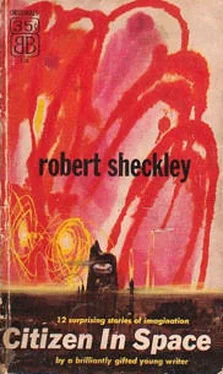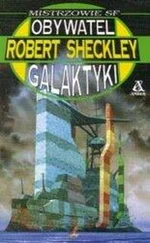"Good!" Dengue cried, sitting upright. "That big one? Excellent." He leaned back and stared dreamily at the ceiling. "That mountain was standing while Man was grubbing in the dirt for insects and scavenging what the saber-tooth left behind. Lord, it's even older than that!" Dengue laughed happily and sipped his drink. "That mountain overlooked the sea when Man — I refer to our noble species homo sapiens — was a jellyfish, trying to make up its mind between land and sea."
"All right," Morrison said, "that's enough."
Dengue looked at him shrewdly. "But I'm proud of you, Morrison, I'm proud of all of us. We've come a long way since the jellyfish days. What nature took a million years to erect we can tear down in a single day. We can pull that dinky mountain apart and replace it with a concrete and steel city guaranteed to last a century!"
"Shut up," Morrison said, walking forward, his face glowing. Lerner put a restraining hand on his shoulder. Striking an observer was a good way to lose your ticket.
Dengue finished his drink and intoned sonorously, "Stand aside, Mother Nature! Tremble, ye deep-rooted rocks and hills, murmur with fear, ye immemorial ocean sea, down to your blackest depths where monsters unholy glide in eternal silence! For Great Morrison has come to drain the sea and make of it a placid pond, to level the hills and build upon them twelve-lane super highways, complete with restrooms for trees, picnic tables for shrubs, diners for rocks, gas stations for caves, billboards for mountain streams, and other fanciful substitutions of the demigod Man."
Morrison arose abruptly and walked out, followed by Lerner. He felt that it would almost be worthwhile to beat Dengue's face in and give up the whole crummy job. But he wouldn't do it because that was what Dengue wanted, what he was hired to accomplish.
And, Morrison asked himself, would he be so upset if there weren't a germ of truth in what Dengue said?
"Those natives are waiting," Lerner said, catching up with him.
"I don't want to see them now," Morrison said. But distantly, from a far rise of hills, he could hear their drums and whistles. Another irritation for his poor men. "All right," he said.
Three natives were standing at the North Gate beside the camp interpreter. They were of human-related stock, scrawny, naked stone-age savages.
"What do they want?" Morrison asked.
The interpreter said, "Well, Mr. Morrison, boiling it down, they've changed their minds. They want their planet back, and they're willing to return all our presents."
Morrison sighed. He couldn't very well explain to them that Work Order 35 wasn't «their» planet, or anyone's planet Land couldn't be possessed — merely occupied. Necessity was the judge. This planet belonged more truly to the several million Earth settlers who would utilize it, than to the few hundred thousand savages who scurried over its surface. That, at least, was the prevailing philosophy upon Earth.
"Tell them again," Morrison said, "all about the splendid reservation we've set aside for them. We're going to feed them, clothe them, educate them —"
Dengue came up quietly. "We're going to astonish them with kindness," he said. "To every man, a wrist watch, a pair of shoes, and a government seed catalogue. To every woman, a lipstick, a bar of soap, and a set of genuine cotton curtains. For every village, a railroad depot, a company store, and —"
"Now you're interfering with work," Morrison said. "And in front of witnesses."
Dengue knew the rules. "Sorry, old man," he said, and moved back.
"They say they've changed their minds," the interpreter said. "To render it idiomatically, they say we are to return to our demonland in the sky or they will destroy us with strong magic. The sacred drums are weaving the curse now, and the spirits are gathering."
Morrison looked at the savages with pity. Something like this happened on every planet with a native population. The same meaningless threats were always made by pre-civilized peoples with an inflated opinion of themselves and no concept at all of the power of technology. He knew primitive humans too well. Great boasters, great killers of the local variety of rabbits and mice. Occasionally fifty of them would gang up on a tired buffalo, tormenting it into exhaustion before they dared approach close enough to torture out its life with pin pricks from their dull spears. And then what a celebration they had! What heroes they thought themselves!
"Tell them to get the hell out of here," Morrison said. "Tell them if they come near this camp they'll find some magic that really works."
The interpreter called after him, "They're promising big bad trouble in five supernatural categories."
"Save it for your doctorate," Morrison said, and the interpreter grinned cheerfully.
By late afternoon it was time for the destruction of the mountain without a name. Lerner went on a last inspection. Dengue, for once acting like an observer, went down the line jotting down diagrams of the charge pattern. Then everyone retreated. The explosions men crouched in their shelters. Morrison went to Control Point Able.
One by one the section chiefs reported their men in. Weather took its last readings and found conditions satisfactory. The photographer snapped his last «before» pictures.
"Stand by," Morrison said over the radio, and removed the safety interlocks from the master detonation box. "Look at the sky," Lerner murmured. Morrison glanced up. It was approaching sunset, and black clouds had sprung up from the west, covering an ocher sky. Silence descended on the camp, and even the drums from nearby hills were quiet.
"Ten seconds. five, four, three, two, one — now!" Morrison called, and rammed the plunger home. At that moment, he felt the wind fan his cheek.
Just before the mountain erupted, Morrison clawed at the plunger, instinctively trying to undo the inevitable moment.
Because even before the men started screaming, he knew that the explosion pattern was wrong, terribly wrong.
Afterward, in the solitude of his tent, after the injured men had been carried to the hospital and the dead had been buried, Morrison tried to reconstruct the event. It had been an accident, of course: A sudden shift in wind direction, the unexpected brittleness of rock just under the surface layer, the failure of the dampers, and the criminal stupidity of placing two booster charges where they would do the most harm.
Another in a long series of statistical improbabilities, he told himself, then sat suddenly upright.
For the first time it occurred to him that the accidents might have been helped.
Absurd! But planetary construction was tricky work, with its juggling of massive forces. Accidents happened inevitably. If someone gave them a helping hand, they could become catastrophic.
He stood up and began to pace the narrow length of his tent. Dengue was the obvious suspect. Rivalry between the companies ran high. If Transterran Steel could be shown inept, careless, accident-ridden, she might lose her charter, to the advantage of Dengue's company, and Dengue himself.
But Dengue seemed too obvious. Anyone could be responsible. Even little Lerner might have his motives. He really could trust no one. Perhaps he should even consider the natives and their magic — which might be unconscious psi manipulation, for all he knew.
He walked to the doorway and looked out on the scores of tents housing his city of workmen. Who was to blame? How could he find out?
From the hills he could hear the faint, clumsy drums of the planet's former owners. And in front of him, the jagged, ruined, avalanche-swept summit of the mountain without a name was still standing.
He didn't sleep well that night
The next day, work went on as usual. The big conveyor trucks lined up, filled with chemicals for the fixation of the nearby swamps. Dengue arrived, trim in khaki slacks and pink officer's shirt.
Читать дальше







